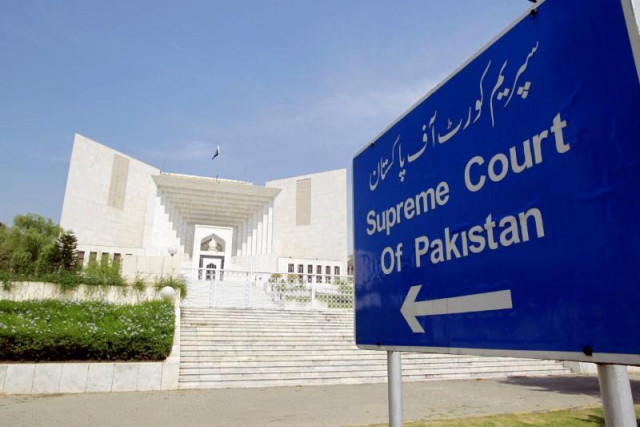SC asks parliament to redefine ‘terrorism’
Says existing definition in section 6 of ATA ‘too wide’ and includes so many actions

A view of the Supreme Court of Pakistan in Islamabad. PHOTO: REUTERS
“We may observe that the definition of ‘terrorism’ contained in section 6 of the Anti-Terrorism Act (ATA), 1997 as it stands at present is too wide and the same includes so many actions, designs and purposes which have no nexus with the generally recognized concept of what terrorism is,” said a 59-page judgment authored by Chief Justice of Pakistan (CJP) Asif Saeed Khosa
The order said including some other heinous offences in the preamble and the Third Schedule to the ATA for trial by an anti-terrorism court (ATC) puts an extra and unnecessary burden on such courts and causes delay in trial of actual cases of terrorism.
“It is, therefore, recommended that the parliament may consider substituting the present definition of ‘terrorism’ by a more succinct definition bringing it in line with the international perspectives of that offence and focusing on violent activities aimed at achieving political, ideological or religious objectives.
“We further recommend that the parliament may also consider suitably amending the Preamble to the Act and removing all those offences from the Third Schedule to the Act which offences have no nexus with the offence of terrorism,” the judgment added.
Apex court to define ‘terrorism’ soon
The meaning, scope and import of the term ‘terrorism’ is defined in Section-6 of the ATA 1997. It has been amended repeatedly and has been the subject of controversy in the apex court for some time.
Different benches of varying strength while deciding different cases have differed with each other in the past and have understood and interpreted the said term differently.
It was in this backdrop that a seven-judge larger bench was constituted s to put an end to that controversy. The bench, headed by the CJP Khosa, had reserved its verdict in April, which was unveiled on Wednesday,
Renowned lawyer Saiful Malook described it as a good judgment “which has approved Basharat case authored by CJP Khosa himself”. However, he said, throwing acid on women will no more be regarded as terrorism if the parliament does legislation in line with the Wednesday ruling.
The court said the motive behind an action rather than fear created should determine terrorism.
“It is no longer the fear or insecurity actually created or intended to be created or likely to be created which would determine whether the action qualifies to be termed as terrorism or not but it is now the intent and motivation behind the action which would be determinative of the issue irrespective of the fact whether any fear and insecurity was actually created or not.”
The judgment noted that creating fear or insecurity in the society is not by itself terrorism unless the motive itself is to create fear or insecurity in the society and not when fear or insecurity is just a byproduct, fallout or an unintended consequence of a private crime.
The court said mere shock, horror, dread or disgust created or likely to be created in the society does not transform a private crime into terrorism.
It said terrorism as in ‘ism’ is a totally different concept which denotes commission of a crime with the design or purpose of destabilising the government, disturbing the society or hurting a section of the society with a view to achieving objectives which are essentially political, ideological or religious.
Justice Isa again questions impartiality of SJC
“This approach also appears to be in harmony with the emerging international perspective and perception about terrorism,” the judgment said.
It also added that the international perception is also becoming clearer on the point that a violent activity against civilians that has no political, ideological or religious aims is just an act of criminal delinquency, a felony, or simply an act of insanity unrelated to terrorism.
“This metamorphosis in the anti-terrorism law in our country has brought about a sea change in the whole concept as we have understood it in the past and it is, therefore, of paramount importance for all concerned to understand this conceptual modification and transformation in its true perspective.”
The judgment said any action constituting an offence, howsoever grave, shocking, brutal, gruesome or horrifying, does not qualify to be termed as terrorism if it is not committed with the design or purpose specified or mentioned in clauses (b) or (c) of subsection (1) of section 6 of the ATA.
It said actions specified in subsection (2) of section 6 of that Act do not qualify to be labeled as terrorism if such actions are taken in furtherance of personal enmity or private vendetta.
“We may add here that the Anti-Terrorism Act, 1997 was introduced about twenty-two years ago but in all these years, to the best of our knowledge, the provisions of subsection (3) of section 6 of that Act have never before been pressed into service in any reported case in the country.
“It appears that the judges and lawyers in the country have found the said provisions to be so confusing and incentive-incompatible that they have kept themselves away from the same so far.”
It said it is about time that the legislature may like to have another look at the said provisions and to consider deleting or suitably amending the same so as to bring them in harmony with the remaining provisions of the act.
The judgment said the court could appreciate that the mindset inherited by us in the background of the Summary Military Courts, Speedy Trial Courts and Special Courts for Suppression of Terrorist Activities, may take some time to be dispelled.
“It may take us a while to appreciate and realise that an act of ‘terrorism’ is not just a grave offence but it is a class and species apart and this class or species has to be understood in its true and correct perception and perspective.
“Otherwise every serious offence may be found by one judge or the other to involve terrorism depending upon a subjective assessment of the potential of the act to create some sense of fear or insecurity in some section of the society.
“Such an approach…may not be wholesome as it may ultimately result in every case of a serious offence landing in a special court and thereby rendering the ordinary courts substantially redundant,” it added.


















COMMENTS
Comments are moderated and generally will be posted if they are on-topic and not abusive.
For more information, please see our Comments FAQ